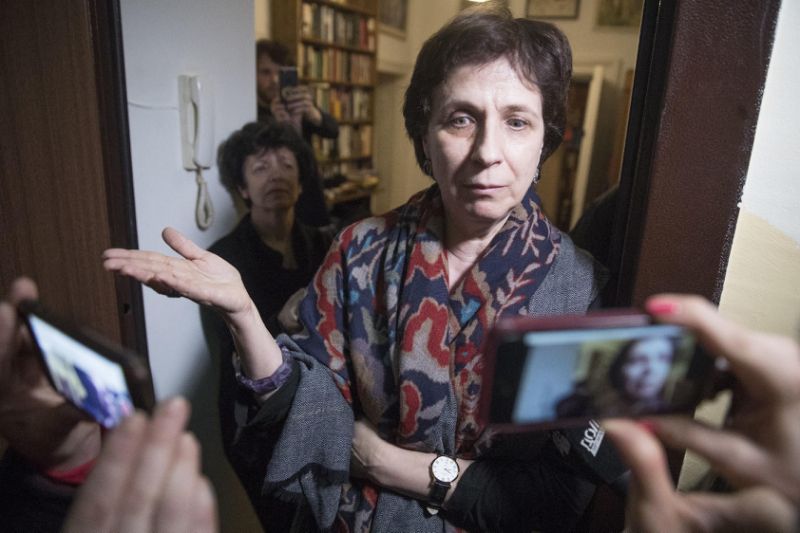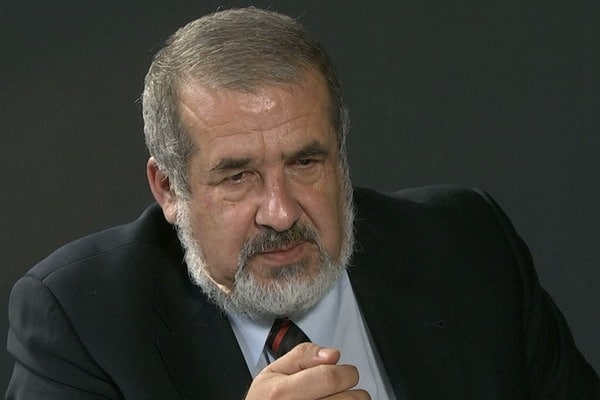As a person who helped the Ukrainian army, contributed to the civil blockade of Crimea and was accused of state treason under Russian law, Ivan Yatskin is recognized as a Ukrainian political prisoner of the Kremlin by the Crimea Human Rights Group.
What do we know about Ivan Yatskin?
On 6 December, Nikolai Polozov, the lawyer of Ukrainian political prisoner of the Kremlin Ivan Yatskin, wrote that his defendant departed from his prison in the Russian prison of Saratov to the Kemerovo region in Siberia. This will make it impossible for his family from Crimea, including four minor children and wife, to visit him.
Ivan Yatskin (43 years old) is a Ukrainian citizen born in Voikovo village in the Ukrainian peninsula of Crimea. He is the father of four minor children, one of which was born after Mr Yatskin had been imprisoned. The man is accused of espionage (“state treason” under Russian legislation) for the Security Service of Ukraine, who deny this fact. Arrested in October 2019, he was sentenced to 11 years’ imprisonment in May 2021 by a Moscow-controlled court in Crimea.
The Memorial human rights center reports that Mr Yatskin has pro-Ukrainian views. With the Russian occupation of the peninsula, he moved to mainland Ukraine to help raise funds for the needs of the Ukrainian army in the conflict with Russia. Allegedly, he partook in combat as a volunteer fighter. The fact that at that time Mr Yatskin underwent treatment from some injury may be a testimony to this, the Memorial says. In 2015, he joined the civil blockade of Crimea, an act to impede any economic ties with the occupied peninsula.
Later, Ivan Yatskin returned to Crimea, where his wife, a Crimean Tatar, and children live.
The case of Ivan Yatskin
Ivan Yatskin was detained on October 16, 2019 in Crimea. No information about him was available for four months. Mr Yatskin remained in total isolation. Russian authorities charge the man with spying for Ukraine. Allegedly, he transferred information containing Russia’s state secrets (related to Russia’s security officers in the peninsula) to the Security Service of Ukraine.
The procedure of a “state treason” case is that the parties involved, including a lawyer, must sign a non-disclosure form since the case involves classified data. Moreover, such cases are considered in a closed procedure. Accusing people like Ivan Yatskin under this particular article of the criminal code of Russia provides safe space for violations of the defendant’s procedural rights.
On May 21, 2021, the Supreme Court of Crimea sentenced Ivan Yatskin to 11 years behind bars. His mother and wife could not attend the hearing, since it was a closed one.
Gulnara Kadyrova, Mr Yatskin’s wife, recalls how he was arrested at 6 am:
“To be frank, I did not realize what happened. It’s just that at some moment, a crowd of people came in our house, with cameras, weapons, in masks and FSB patches. The only thing I could say is to ask to [be allowed] get dressed…
He was taken very quickly, I ran after him to at least say goodbye, but with shouts of ‘citizen! This is not allowed’ they very quickly returned me to the house. I mean, I didn’t even get to hug him.”

Ivan Yatskin was detained on the eve of his mother’s birthday. On that day, the family was supposed to get together. But Gulnara and the kids arrived without Ivan.
“Imagine, I come to see her alone with children, she is so happy, comes to meet us and asks, smiling, ‘Where is Vanya [nickname for Ivan]?’ To explain [everything] to the mother was one of the hardest things,” says Gulnara.

Gulnara describes that their children did not realize what happened to their father:
“Rinatka, for example, was watching cartoons, time to time looking at what the masked people were doing. Arsen is more communicative, so he was walking around the detective and taking his pens, papers, while he was filling the documents.”

Treatment of Ivan Yatskin in prison
In summer 2021, Vladyslav Yesypenko, a Ukrainian Radio Free Europe/Radio Liberty contributor and Russia’s political prisoner met Ivan Yatskin while in a Crimean prison.
Mr. Yesypenko reported that while imprisoned in Moscow, Ivan Yatskin had been given psychotropic drugs and now the man remembers nothing of this stay there. Also, according to the journalist, Mr. Yatskin had his toes frozen off because, in the wintertime, he was taken out of the prison only in slippers.
As Ukrainian Ombudsman Liumdyla Denisova wrote on her Facebook, the inflammation of blood vessels in his legs led to trophic ulcers and abscesses. No medical treatment is provided.
Ms Denisova is concerned
that a hunger strike Mr Yatskin had started may deteriorate his health. She appealed to her Russian vis-a-vis, Tatiana Moskalkova, to ensure that Ivan Yatskin is held in conditions in accordance with international standards. The Ombudsman further noted that the inhuman treatment of a Ukrainian national appears a grave violation of Article 3 European Convention on Human Rights (prohibiting torture and inhuman or degrading treatment or punishment) and Article 22 UN’s Standard Minimum Rules for the Treatment of Prisoners (on availability of medical services).
As Mr Polozov notifies, Mr Yatskin was subjected to severe psychological pressure. To be more specific, prison staff threatened that his family back in Crimea may be in trouble. And in January 2021, it became known that the man got rib injuries, possibly, fractures, as a result of alleged falling. Moreover, his eyesight gravely deteriorated. Once again, no doctors come to see Ivan Yatskin.
One of them is the case Ilascu and Others v Moldova and Russia (2004), when four detainees were held in a dire prison environment that deteriorated their health but they did not receive adequate medical care. The Court likened such treatment to torture. And in the case Jasinskis v. Latvia (2010), the Court ruled that by failing to medically examine the detainee prior to taking him into custody, the state breached the European Committee for the Prevention of Torture standards.
As for Ivan Yatskin’s hunger, his lawyer Mr Polozor likens it to “systematic pressure and abuse” from the side of prison staff. Namely, the man was deprived of medicine and bandages, precluded from calling his family. The officers cut his only bag for personal belongings while conducting a search, broke all his cigarettes. They demanded that he destroy his appeal to the Russian Ombudsman. According to Denisova, Mr Yatskin was not allowed to buy water in a local shop, and tap water from prison is unfit for drinking.
Is the case politically motivated?
According to Mr Polozov, this is a political case as the “continuation of persecution of Ukrainian citizens in occupied Crimea.” He draws a parallel with the cases of Ukrainian “saboteurs.”
Accusing Ukrainians of trumped-up sabotage is not new to the Russian special services. On 9 November 2016, Russian officers arrested Dmytro Shtyblikov and Oleksiy Bessarabov, two employees of Crimean think tank “Nomos,” and their friend Volodymyr Dudka. The men were charged with preparing diversions in Crimea at the request of the Ukrainian intelligence. Shtyblikov was convicted to five years’ imprisonment (as he pleaded guilty under torture), and Dudka and Bessarabov were sentenced to 14 years behind bars each. Coerced video confessions echoing the Soviet tradition and planted weapons served as so-called “evidence” in this case.
By likening Ukrainians to saboteurs, Putin aims at intimidating the population of Russia and Crimea, Olha Skrypnyk, Head of the Crimean Human Rights Group, said.
Notably, these men’s names are on the list of the Freedom House and resolution of the European Parliament dated 18 July 2019.
How Crimean Tatar leader Dzhelyal swelled the ranks of Ukrainian “saboteurs”
Related:
- Crimean Tatar leader Dzhelyal kept in unheated Russian prison as temperatures approach freezing
- Why this Crimean Tatar Muslim woman gives the Russian occupation authorities a headache
- Pull off a kangaroo court in five easy steps: a how-to guide from Russia
- “After they electrocuted me, I told them everything they needed.” How Russia’s FSB extracted a “confession” from a Crimean Tatar
- Painkillers instead of hospital: Russia’s torture of critically-ill Crimean Tatar political prisoners continues unabated
- How Crimean Tatar leader Dzhelyal swelled the ranks of Ukrainian “saboteurs”
- Stalin executed their great-grandfather 83 years ago. Now Russia sentenced these Crimean Tatars on same charges
- Seven years of occupation of Crimea: human rights activists systematise human rights violations on peninsula
- “I do not want my children to live in a country of terror.” Four inspiring letters from Crimean Tatar political prisoners not broken by Russia
- Russia’s vile attempts to discredit the Crimean Tatars must not be kept silent
- Photo project spotlights Crimean Tatar kids born after their fathers’ unlawful arrests by Russian occupation authorities
- Russian prison system is a ticking time bomb for health of a Crimean Tatar





